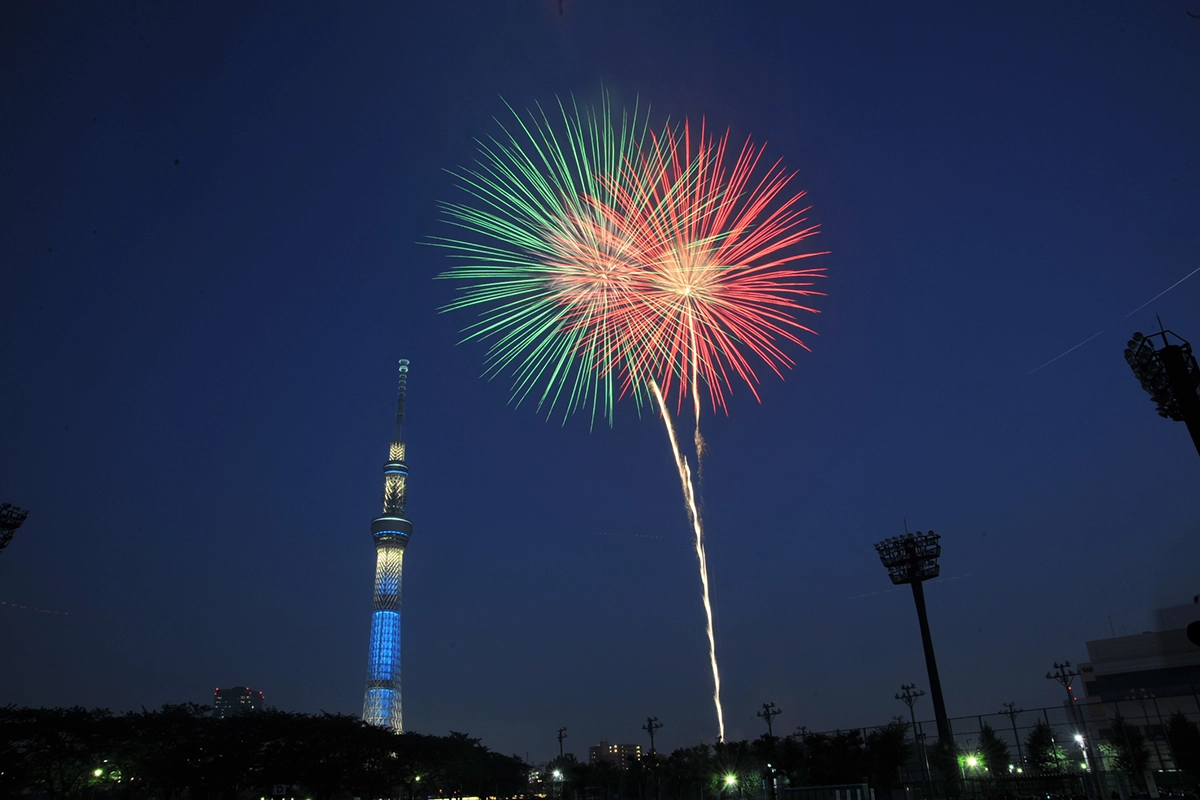A Symphony in the Night Sky: Sumida River Fireworks Festival
As the sun dips below the Tokyo skyline on the last Saturday of July, a sense of anticipation fills the air. Locals and tourists alike gather along the Sumida River, each drawn by the allure of one of Tokyo’s most dazzling summer spectacles – the Sumida River Fireworks Festival. This enchanting event, steeped in tradition and held against the mesmerizing backdrop of the Sumida River, is a true testament to the artistry of fireworks and the spirit of community celebration.
Location and Accessibility:
The Sumida River Fireworks Festival takes place on the banks of the Sumida River, nestled in the heart of Tokyo. Its central location makes it easily accessible to all, whether you are navigating Tokyo’s intricate subway system to reach Asakusa Station or arriving by JR line at Ryogoku Station. With both stations within walking distance of the festival grounds, reaching this captivating event is a breeze. For a unique vantage point, consider arriving by boat, as numerous cruise companies offer special fireworks viewing cruises, providing an unforgettable, waterside perspective of the show.
Festivities and Activities:
While the fireworks themselves are undoubtedly the main attraction, the Sumida River Fireworks Festival offers a plethora of supplementary festivities that truly make it a full-blown celebration. Food stalls line the streets, offering a delectable array of Japanese cuisine, snacks, and refreshing drinks. The aroma of sizzling yakitori and savory takoyaki fills the air, tempting taste buds and providing a culinary adventure for visitors. Moreover, the festival features live music performances, traditional Japanese dance showcases, and other cultural events that promise to enrich your experience.
The diversity of activities at the festival allows you to immerse yourself in Japanese culture while awaiting the main event. The lively atmosphere created by these festivities ensures that the Sumida River Fireworks Festival is not merely a fireworks display but a memorable cultural extravaganza.
Tips for Viewing the Fireworks:
To secure a prime viewing spot for the fireworks, it’s advisable to arrive well in advance. Many seasoned festival-goers bring blankets, cushions, and picnic supplies to make themselves comfortable along the riverbank, transforming the hours leading up to the fireworks into a delightful outdoor gathering. As the evening progresses, it’s essential to navigate through the growing crowd with patience and respect for fellow attendees, adhering to the event organizers’ rules and regulations to ensure a harmonious experience for all.
History and Significance:
The roots of the Sumida River Fireworks Festival run deep, tracing back to the Edo period when fireworks were employed to repel malevolent spirits. Over time, the festival has evolved into a cultural celebration of summer and a profound appreciation for the art of fireworks. In Japanese culture, the event also symbolizes unity and community spirit, with locals and tourists coming together to revel in the splendor of the night sky.
Weather Considerations:
Held during the height of summer, the festival presents a unique set of weather considerations. Tokyo’s summer temperatures often soar above 30 degrees Celsius, so it’s advisable to dress comfortably, wear sunscreen, and stay well-hydrated throughout the day. Bring along a bottle of water or a traditional Japanese fan to help beat the heat. Be aware that in the case of rain or adverse weather conditions, the fireworks display may be postponed or canceled, so it’s a good idea to check the weather forecast before embarking on your Sumida River Fireworks Festival adventure.
In summary, the Sumida River Fireworks Festival is not just a fireworks display; it’s a symphony of tradition, culture, and community spirit that lights up the Tokyo summer night. Whether you come for the brilliant explosions in the sky, the tantalizing street food, or the vibrant cultural performances, this festival promises an unforgettable evening that embodies the essence of Japanese summer.
